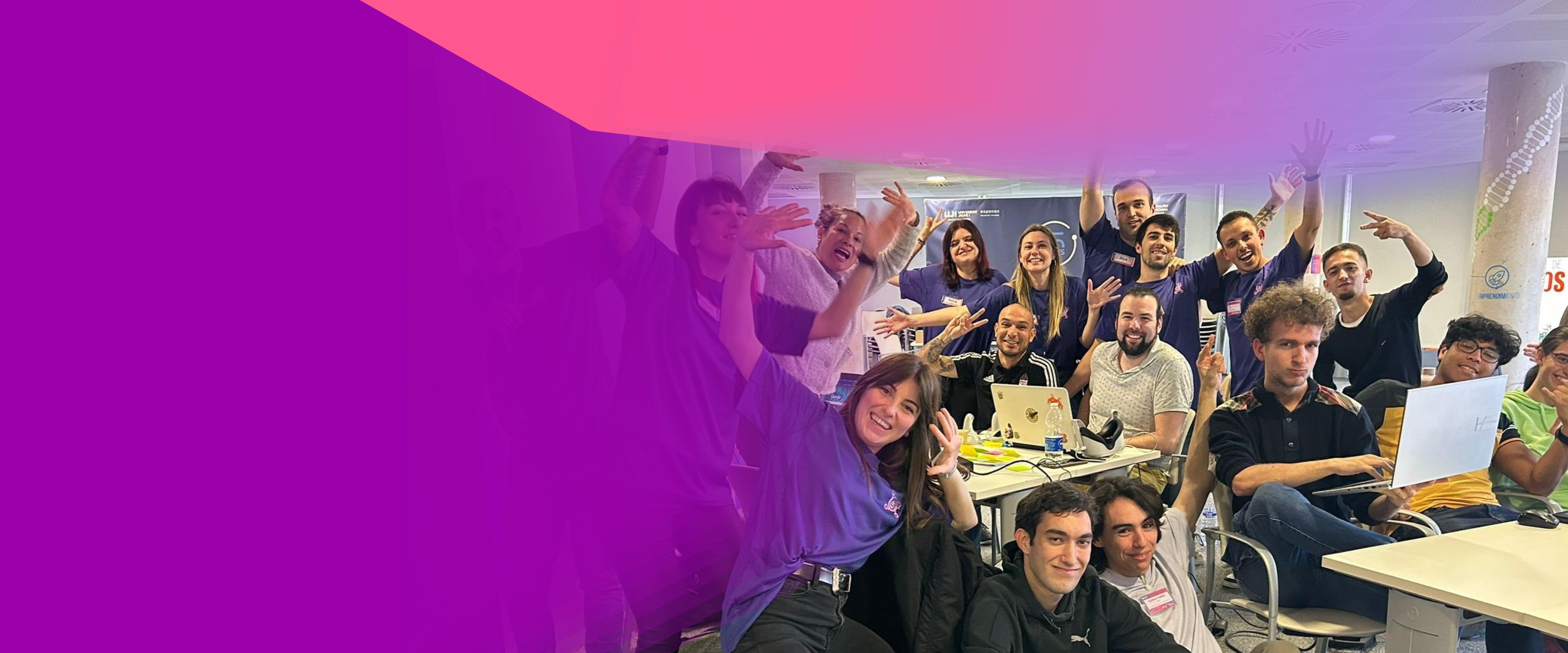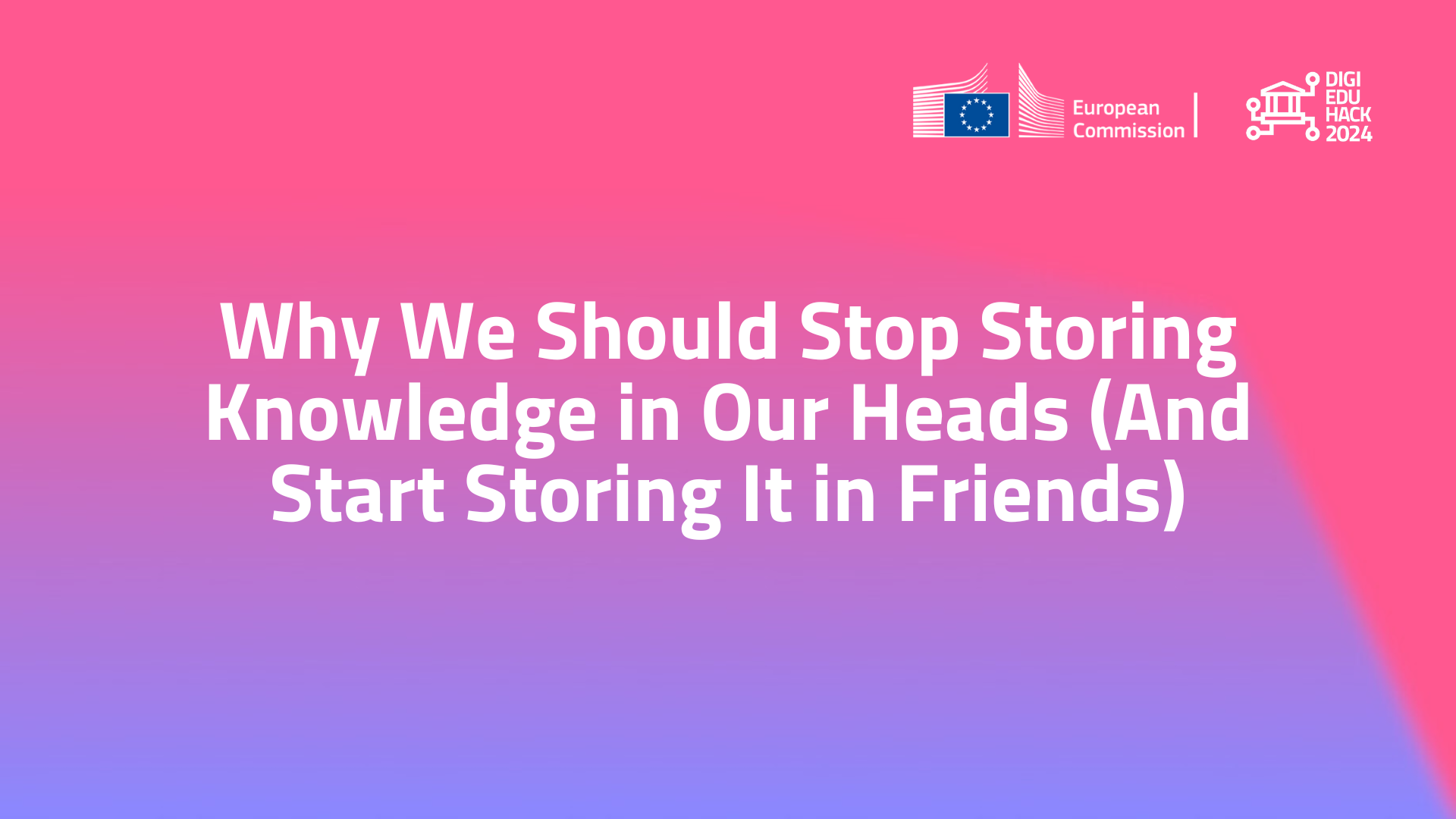Why We Should Stop Storing Knowledge in Our Heads (And Start Storing It in Friends)
Key insights from our conversation with Bart Verswijvel, DigiEduHack National Ambassador and Digital Learning Expert at Future Classroom Lab, created by the European Schoolnet and Lernacon.
In our latest episode of the DigiEduHack podcast, we sat down with Bart Verswijvel, a long-time teacher and digital learning strategist, to unpack why now is a pivotal moment to rethink the role of knowledge, collaboration, and challenges in education.
Bart argues that we’ve reached a point where storing knowledge in our heads is no longer enough—or even realistic. Instead, we should focus on how we build shared understanding through networks, communities, and challenge-based approaches.
From Spellcheck to AI: How Tech Went from Helper to Substitute
“AI came through the back door of the school,” Bart opens with a powerful metaphor. Teachers didn’t choose it—it just appeared. Unlike spellcheckers or projectors, AI isn’t only assisting teaching, but it’s also substituting key functions like writing, analysis, and content creation.
The result? Teachers feel disoriented, sometimes fearful, surrounded by a technological jungle. They’re grappling with both ethical concerns (bias, privacy, misinformation) and pedagogical dilemmas, asking how does one assess learning when AI can write a flawless essay?
"We’ve outsourced critical thinking and creativity to a machine.
That’s a pedagogical concern."
The Challenge Isn't Just AI—It’s Sustainable Teaching
Bart urges hackathon hosts to start with a fundamental question: What’s keeping teachers from thriving? He shares his work on sustainable teaching, which recognises that besides low pay, it is burnout, isolation, and system fatigue that drive educators away.
Technological change is just one layer. What really matters is the human experience of teaching: relationships, reflection, and the ability to stay curious without getting stuck in cycles. Hackathons, he suggests, offer a rare chance for teachers to pause, reconnect, and articulate what truly matters in their work - something they often don’t get the chance to discuss openly. What motivates them? What frustrates them? What do they dream of changing?
“When you start from personal motivation, you get better outcomes.”
Bart advocates for mixed DigiEduHack teams of teachers, learners, tech developers, and industry stakeholders—groups where surprising voices emerge and where solutions reflect the actual needs of classrooms.
From Isolated Experiments to Systemic Change
Today’s educational landscape is already buzzing with grassroots activity. Teachers are creating materials, launching courses, and swapping strategies—especially in response to AI. The challenge now is scale: how can small, local experiments ripple outward through networks to create systemic change? Bart believes that hackathons, when well framed, can tap into this potential and translate fragmented efforts into scalable strategies.
Beyond innovation, hackathons create fertile ground for collaboration and human connection. The intensity of working side by side, sharing challenges, and celebrating small victories naturally cultivates bonds that extend far beyond the event itself.
The Future Classroom Lab: Learning by Doing
Bart closes with a reminder: change in education doesn’t start with theory. It starts with experience. Teachers need low-barrier, realistic tools they can try the very next day. And they need to know they’re not alone.
At the Future Classroom Lab of European Schoolnet, educators learn by stepping into the learner’s shoes. “We never start with lectures,” he says, “we start with doing.” This approach reflects Bart’s wider point: education should not be about storing knowledge in our heads, but about applying it in practice and sharing it through networks.
Hackathons mirror this principle, giving participants the chance to learn by experimenting, co-creating, and testing ideas in real time. Through DigiEduHack ambassador networks and Erasmus+ opportunities, Bart and his team are helping educators across Europe find practical, adaptable ways to bring innovation into their daily teaching—one small step at a time.
Conclusion
Bart’s message is clear: the future of education is not about hoarding knowledge individually, but about applying it collectively. What matters is how we build shared understanding, how we stay motivated, and how we keep teaching sustainable - ethically, pedagogically, and personally. Hackathons can be the spark, but real change comes when educators collaborate, experiment, and support each other to shape what is next.
Continue the Conversation
This article only scratches the surface of the frameworks, examples, and practical strategies Bart shared in our full conversation.
Listen to the complete conversation here.
We'd love to hear your thoughts and experiences with challenge-based learning. What are your thoughts about collaborative intelligence building in your educational context? What challenges are you facing in implementation?
Connect with us:
- Continue the discussion on LinkedIn
- Share your implementation stories using #DigiEduHack Stories
- Connect with Bart Verswijvel and Future Classroom Lab.
This article emerged from Episode 2 of DigiEduHack podcast, featuring Bart Verswijvel. For more conversations about the future of learning, subscribe wherever you listen to podcasts.

